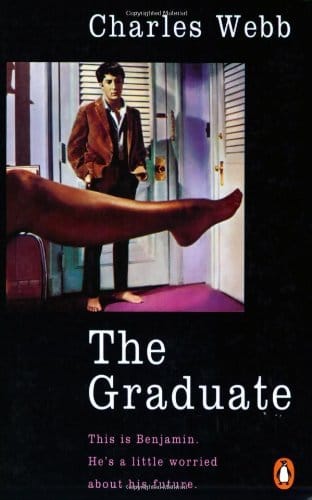Review: The Graduate
Can you like a book yet hate the protagonist and everything he stands (or in this case, slouches) for?

Let’s start with the positive. The The Graduate by Charles Webb is a quick and easy read (yes, that can be a good thing) and is well written. We’re not talking Shakespeare well-written, but certainly engaging. Presented primarily in dialogue, the book reads almost like a play.
Considered ground-breaking and seminal, The Graduate was written in 1963 and was called “brilliant, sardonic, ludicrously funny” by the New York Times. This was the first work of author Charles Webb, who went on to write other books of considerably less fame. Actually someone could write a fascinating book about Charles Webb – his life seems strange and quirky to say the least (check it out chez Wikipedia).
So far, so good.
Webb’s character, Benjamin Braddock, has just graduated college and he’s emotionally and spiritually lost. He’s also a spoiled rotten child of what was then the brave new world of suburbia, financially pampered, emotionally and materialistically indulged. He seems to want to project an air of edginess, modernity (at least in terms of modern angst), and wants to reject traditional values.
So how does our hero go about this? He mopes around the house after graduating, lolls around in Mommy and Daddy’s swimming pool, drives about in the sports car given to him by Mommy and Daddy, and has a sordid and meaningless affair with the (much older) wife of a long-time friend of the family.
Our hero is also breathtakingly misogynistic – so much so that I don’t even know where to start. His treatment of the object of his shallow affections, the famous Mrs. Robinson, is reprehensible. Mrs. Robinson, despite being an adulterous wife, is actually the more likeable of the pair. She is witty, relatively urbane, and is perhaps more pitiable for being forever trapped in her suburban prison.
Mr. Ro[1]binson, unaware of the relationship between his wife and his best friend’s son, thinks it would be great to have Benjamin go on a date with his daughter, Elaine.
Not having a good reason to reject this, Benjamin will go on ONE date with Elaine.
Mrs. Robinson has only a single request – and a perfectly understandable one. She tells Benjamin that he must not continue dating her daughter (well, duh!). Of course our hero, apparently unused to being told not to do anything that might flit through his mind, decides that he must have a relationship with Elaine and stop seeing Mrs. Robinson.
Regular dating begins and Benjamin is quite taken with Elaine – he has nothing in common with her but she’s young, pretty, smart, compliant … and forbidden. Anyway, Elaine discovers the truth about Benjamin’s affair with her mother, and naturally doesn’t want to have anything more to do with him. Elaine then moves on with her life, goes to college, meets another man and decides to marry someone who hasn't slept with her mother.
Benjamin, still obsessed with Elaine, now begins stalking her and finally barges into her wedding ceremony. The author now has Elaine ditching her fiancée at the altar and running off with Benjamin on a city bus (the bus was a nice touch I think).
Well, I despised Benjamin, disliked Elaine, and had a mild distaste for Benjamin’s parents. Neutral on Mr. Robinson. Rather liked Mrs. Robinson.
So if the goal of a written work is to evoke an emotional response, this book scores high for me. But I really hated every engaging minute of it.
Would you like to read more posts? If so, please click the Home Page link below:

You, Dear Reader, are much needed and appreciated.
Everything written requires a reader to make it whole. The writer begins, then you, dear reader, take in the idea and its image, and so become the continuation of its breath. Please subscribe so that my words can breathe. Consider this my hand, reaching out to yours.
